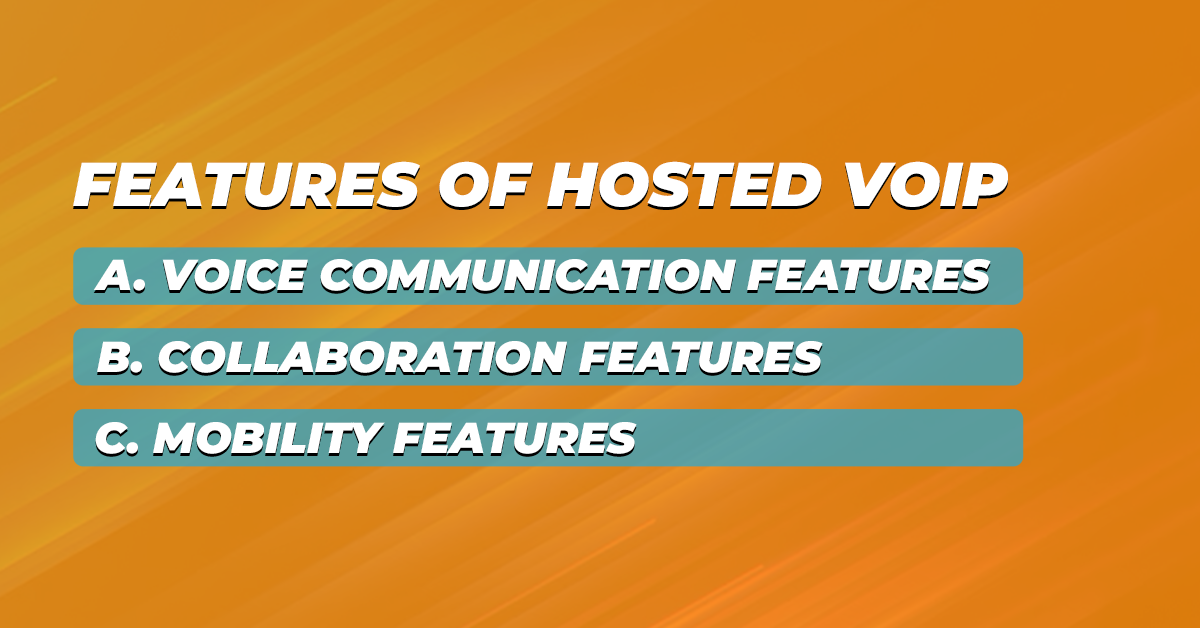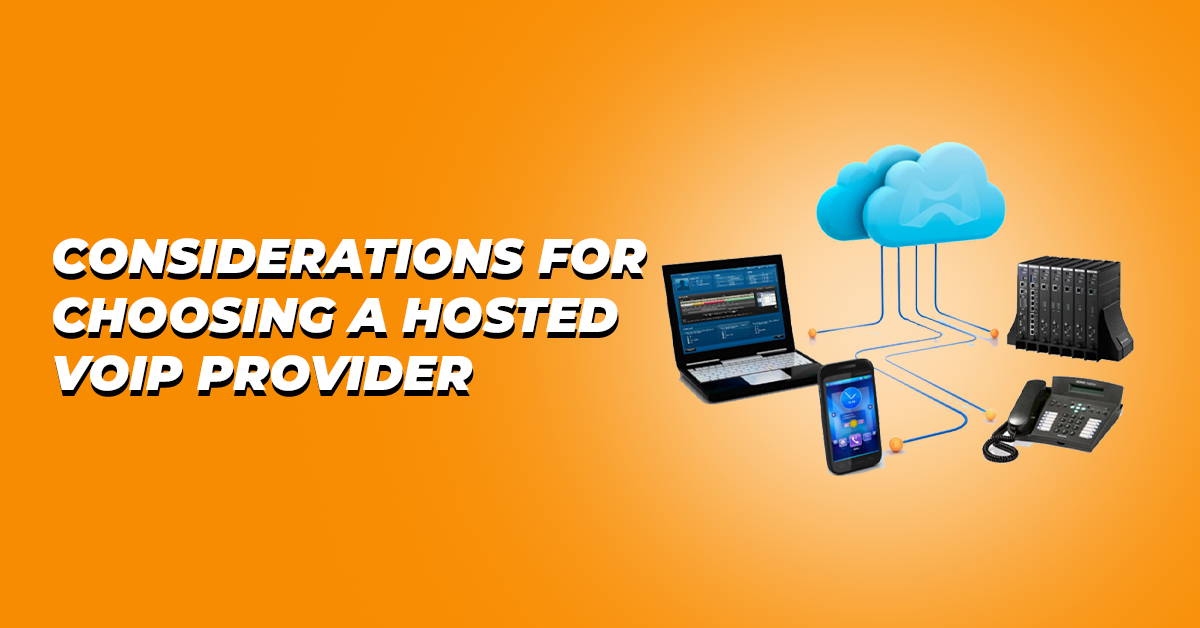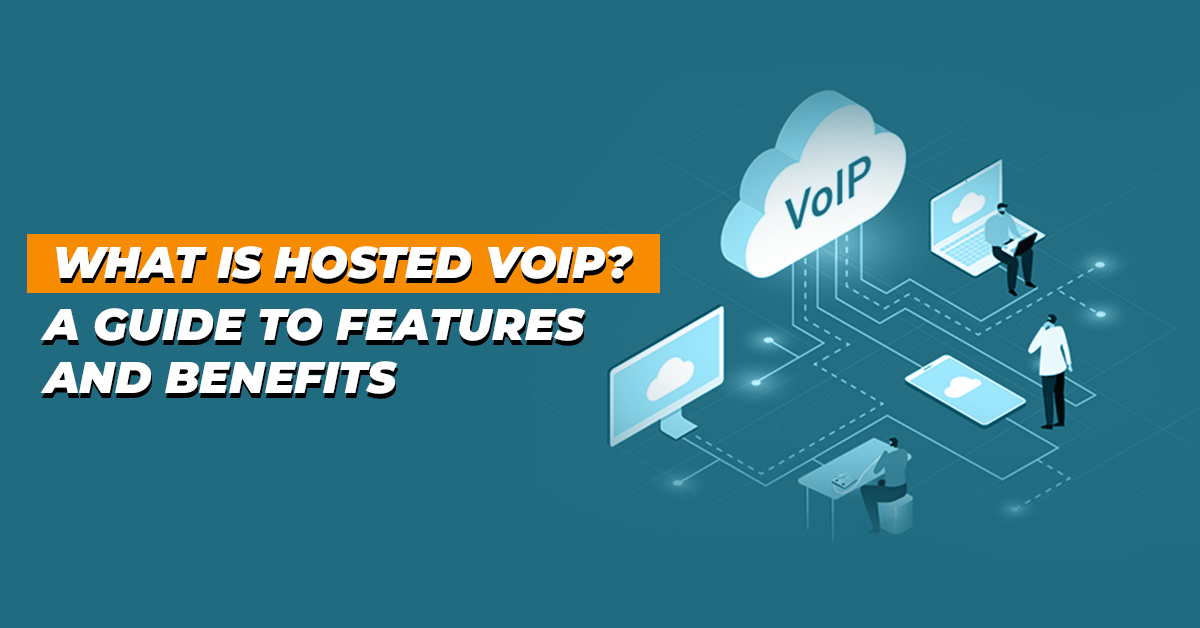Businesses in today’s era are looking for the easiest and cheapest communication system for themselves. They no longer want to depend on bulky traditional hardware to communicate.
Hosted VoIP system offers a more cost-efficient, flexible and scalable communication system. You don’t need any additional hardware for this system; a softphone (app) is enough to make and receive calls through hosted VoIP.
This article will discuss hosted VoIP in detail, including its features and benefits. So, let’s dive in.
What is hosted VoIP, and how does it work?

Hosted VoIP is also known as Voice over Internet Protocol or VoIP phone system. It is a modern business communications solution that enables companies to make and receive calls using an internet connection.
Unlike conventional phone systems that require physical hardware on-site, hosted VoIP operates through cloud-based technology, eliminating the need for bulky equipment and reducing costs for businesses.
This streamlined approach to communication offers numerous benefits, including increased scalability, enhanced flexibility, and improved reliability.
Hosted VoIP works by converting analogue voice signals into digital data packets. Then they are transmitted over the internet. When a call is made, the voice data is broken down into packets, sent across the internet, and reassembled at the receiving end to deliver clear and uninterrupted communication.
This process allows businesses to leverage their existing internet connection for voice communication, offering significant cost savings and flexibility. Additionally, hosted VoIP systems often come with various features, such as auto-attendants, call forwarding, and voicemail-to-email integration, further enhancing productivity and efficiency for business owners and their teams.
Features of Hosted VoIP

-
Voice communication features
Voice communication features are the most crucial hosted VoIP features. These are designed to streamline and enhance business communication processes.
One such feature is auto-attendants, which greet callers with professionally recorded messages and provide options to direct their calls to the appropriate department or extension.
This not only ensures callers are efficiently routed to the right person but also projects a professional image for the business.
Another essential feature is call forwarding, allowing users to redirect incoming calls to other extensions, mobile phones, or voicemail as needed. This ensures that important calls are never missed, even when users are away from their desks, promoting responsiveness and customer satisfaction.
Voicemail-to-email functionality is another valuable feature of hosted VoIP service that converts voicemail messages into audio files and delivers them directly to the user’s email inbox. This enables users to access and manage voicemails from anywhere, enhancing convenience and efficiency in message retrieval and follow-up.
Conference calling capabilities offered by Hosted VoIP systems facilitate seamless collaboration among teams or clients, irrespective of their geographical locations. With the ability to host hassle-free conference calls with multiple participants, businesses can conduct meetings, brainstorming sessions, or client consultations efficiently, fostering productivity and innovation.
Lastly, call recording features enable users to record calls. This feature can help for various purposes, such as quality assurance, training, or compliance.
Later, these recordings can be accessed and reviewed later as needed, providing valuable insights, ensuring regulatory compliance, and facilitating ongoing improvement in communication processes. Together, these voice communication features empower businesses with the tool. They need these tools to communicate effectively, collaborate efficiently, and deliver exceptional customer experiences.
-
Collaboration features
These are pivotal elements of Hosted VoIP systems, fostering seamless teamwork and communication among users. One such feature is video conferencing, which empowers users to conduct face-to-face meetings remotely with colleagues, clients, or partners.
This capability facilitates effective communication and collaboration, regardless of physical distance, enhancing productivity and fostering stronger relationships.
Integrated instant messaging features are another essential component. It enable real-time communication and collaboration among team members. This feature provides a platform for quick decision-making and problem-solving, instant messaging promotes agility and efficiency in day-to-day operations, ensuring timely responses and smoother workflow.
Screen sharing functionality is another valuable communication solution offered by Hosted VoIP systems. This feature enable users to share their screens with others during calls or meetings, facilitating presentations and demonstrations and allowing unified communication and collaborative work sessions.
By enabling visual communication and content sharing, screen sharing enhances clarity and comprehension, driving effective collaboration and knowledge sharing.
Furthermore, Hosted VoIP systems may offer file-sharing capabilities, allowing users to exchange documents, presentations, and other files seamlessly within the communication platform. This streamlines Voip solutions efforts, eliminates the need for separate file-sharing tools, and ensures all team members can access the current information and resources.
Presence indicators are also integral to collaboration, showing the availability status of users and indicating whether they are online, busy, away, or offline.
By providing visibility into users’ availability, presence indicators facilitate efficient communication, reduce unnecessary interruptions, and enable users to gauge the best times to reach out or collaborate with colleagues.
Together, these collaboration features empower users with the tools they need to collaborate effectively, communicate efficiently, and achieve shared goals with ease.
-
Mobility features
These cloud-based business VoIP features empower users with flexibility and accessibility in their communication tools. One such feature is mobile app integration, where Hosted VoIP providers offer dedicated mobile applications that allow users to communicate, access voicemail, and utilize other features using their smartphones or tablets, irrespective of their location.
This flexibility allows users to stay connected and productive while on the go, enhancing efficiency and responsiveness to communication needs.
Another key mobility feature is softphone support, which involves software applications that replicate traditional desk phones on computers or mobile devices.
This enables users to use their devices as extensions of the VoIP system, making and receiving calls seamlessly without the need for physical hardware. Softphone support enhances mobility and convenience, enabling users to stay connected and productive from any physical location.
Furthermore, mobility features often include call routing capabilities, allowing users to route calls to their mobile devices when they are away from their desks. This ensures that users never miss important calls, even when they are out of the office, promoting responsiveness and customer satisfaction.
Hosted VoIP systems also offer unified communication capabilities, integrating voice, messaging, and collaboration tools into a unified platform. This enables seamless communication and collaboration across various devices and locations, enhancing productivity and teamwork.
Moreover, geographical flexibility is a significant benefit of mobility features. International calls allow users to work from anywhere with an internet connection. This capability increases productivity and enables remote work capabilities, empowering users to stay connected and productive regardless of their physical location.
Together, these mobility features provide users with the flexibility and accessibility they need to communicate effectively and stay productive in today’s dynamic work environments.
These features of Hosted VoIP cater to the needs of businesses seeking efficient communication solutions while enhancing collaboration and mobility for their teams.
Benefits of Hosted VoIP

A. Cost Savings
Hosted VoIP offers significant cost savings for businesses compared to traditional phone systems. By eliminating the need for expensive hardware and maintenance costs, businesses can reduce their upfront capital expenditure.
Additionally, Hosted VoIP often operates on a subscription-based model. This allow businesses to pay only for the services they use, which can result in lower monthly bills.
Moreover, international calls are typically much cheaper with Hosted VoIP than traditional phone systems, leading to further cost savings for small and larger enterprises with global operations.
B. Scalability
One of the key advantages of Hosted VoIP is its scalability. As businesses grow or their communication needs change, Hosted VoIP systems can seamlessly scale up or down to accommodate these changes.
Adding new users or extensions is a simple process that can be done virtually without additional physical infrastructure. This scalability ensures businesses can adapt their communication systems to meet evolving demands without incurring significant costs or disruptions.
C. Flexibility
Hosted VoIP offers unmatched flexibility for businesses, allowing employees to communicate from anywhere with an internet-based phone system.
Whether in the office, at home, or on the go, users can access their Hosted VoIP system using desktop phones, softphones, or mobile apps. This flexibility enables remote work capabilities, facilitating collaboration among distributed teams and accommodating the modern workforce’s preference for flexibility and mobility.
D. Enhanced Productivity
By providing advanced communication features and integration with other business tools, Hosted VoIP enhances productivity in the workplace. Features such as auto-attendants, call forwarding, call routing, and voicemail-to-email streamline communication processes, saving employees time and reducing the likelihood of missed messages.
Additionally, integration with customer relationship management (CRM) systems and other business applications allows for seamless workflow automation and improved customer service, further boosting productivity.
E. Advanced Features and Integration
Hosted VoIP systems come equipped with a vast range of advanced features. They go beyond traditional phone systems. These may include video conferencing, instant messaging, screen sharing, and advanced call analytics.
Moreover, Hosted VoIP integrates with various business phone numbers, tools and applications, such as CRM systems, email platforms, and productivity suites, enhancing collaboration and efficiency.
This integration eliminates silos between communication channels and business processes, allowing for seamless information exchange and improved decision-making.
Overall, Hosted VoIP offers numerous benefits for businesses, including cost savings, scalability, flexibility, enhanced productivity, and access to advanced features and integration capabilities. These benefits make Hosted VoIP an attractive communication solution for businesses and industries seeking to streamline communication processes and improve overall efficiency.
Considerations for Choosing a Hosted VoIP Provider

When considering a Hosted VoIP provider, business owners should take several factors into account to ensure they select the right solution for their needs. Firstly, reliability and uptime are crucial considerations, as uninterrupted communication is essential for business operations.
Additionally, scalability is vital to accommodate future growth and changing communication requirements without significant disruptions or additional costs. Furthermore, businesses should evaluate the features and integration capabilities offered by the provider to ensure they align with their communication needs and workflow requirements.
Cost-effectiveness is another key consideration, with businesses seeking a provider that offers competitive pricing without compromising on quality or service.
Finally, customer support and service quality play a significant role in the overall satisfaction with the VoIP provider, as responsive support ensures timely resolution of any issues that may arise.
By carefully considering these factors, business owners can make an informed decision and choose a Hosted VoIP provider that best meets their communication needs and supports their business objectives.
Wrapping Up
Hosted VoIP emerges as a transformative solution for modern businesses seeking efficient, cost-effective, and flexible communication systems. By harnessing the power of cloud-based technology, hosted VoIP eliminates the need for bulky hardware while offering a plethora of features and benefits that enhance productivity, collaboration, and mobility.
Get the best service of hosted VoIP from voipelements and unlock a new level of success for your business.


